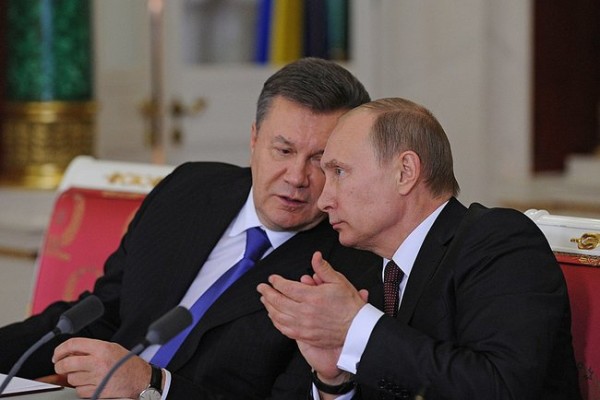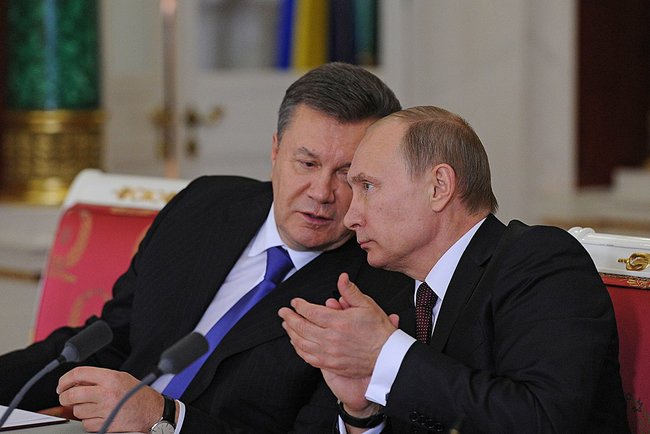
Speaking at West Point on Wednesday, President Obama touted his administration’s response to Russia’s recent belligerence in Ukraine. “Our ability to shape world opinion helped isolate Russia right away,” he said. The public outcry and the pressure exerted by international institutions, he added, have served as an effective “counterweight” to “Russian propaganda and Russian troops on the border and armed militias in ski masks.” In spite of the crisis Ukraine has gone on to hold elections—“without us firing a shot.”
Unfortunately, Obama is mistaken. The momentum is still on Russia’s side. It has forcibly seized and annexed the strategically valuable peninsula of Crimea. It has succeeded in destabilizing eastern Ukraine through a proxy war—secretively supporting ethnic Russian rebellions against the Ukrainian government there. It is quite possible Ukraine will end up losing more of its territory.
For years now, America and the international community have underestimated Vladimir Putin, Russia’s ruthless and unpredictable leader. Obama, for example, has dismissed Russia as a mere “regional power.” And so far the global response to Putin’s latest aggression has been tepid. But this is a serious miscalculation, and it betrays a deep ignorance of Russian power and the dangers it presents.
Related: Victor Epstein on how to counter Russia’s recent aggression
Obama and other world leaders may excoriate Russia’s actions in their speeches, but Putin clearly cares little for what they say. At home his popularity and political capital have only grown, thanks to a state-run propaganda machine that relentlessly praises and “whitewashes” his foreign policy. And while the US and Europe have levied trade sanctions and other punishments on his regime, these have had limited effect.
“Russia cannot be isolated,” Putin said when the sanctions were imposed, and so far he seems to be right. On Wednesday, the EU chose to delay further sanctions against Russia—the very same day as Ukraine’s newly elected president, Petro Poroshenko, called futilely on the West to increase those sanctions and provide Ukraine with military aid. Yesterday, French president François Hollande agreed to meet Putin in person next week. Over the protests of its Western allies, France is pushing ahead with a deal to sell Russia two warships for $1.6 billion. Meanwhile, Russia recently signed an economic agreement with Belarus and Kazakhstan and announced a landmark $400 billion gas deal with China.
Given their dependence on Russian energy and trade, European countries are unwilling to break their ties with Russia in any meaningful way. And in the ongoing trade war that the sanctions unleashed, Russia is clearly willing and able to endure the economic damage—much more so than its opponents. Apparently, Putin has a higher pain threshold than his counterparts on the other side.
Russia has also proven itself more adept in using trade as a weapon. Ukraine’s new president knows this well. Dubbed the “Chocolate King,” Poroshenko made his fortune with the confectioner Roshen, which exports candy to over thirty countries. Last summer, the Russian government banned all imports of Roshen sweets, citing safety concerns. The move was clearly an act of retaliation against Poroshenko, who had helped lead efforts to strengthen Ukraine’s ties to Europe. Months later—in the same week that the Ukrainian government caved to Russian pressure and abandoned a proposed trade deal with the EU—Russia lifted the ban. But this was only a temporary ceasefire in the so-called “chocolate war”: in March, a month after mass demonstrations in Ukraine toppled a regime more favorable to it, Russia seized and closed a Roshen factory in one of its cities, Lipetsk. These targeted reprisals, which have personally cost Poroshenko millions, remind us how inseparable Russia’s trade and business decisions are from its political ambitions—and how brazen Putin can be in getting what he wants.
Currently, Poroshenko faces far bigger challenges than sinking candy profits. Ukraine is suffering from deep economic woes, entrenched corruption and cronyism, and fragmented and sluggish political leadership. It is engaged in what at this point amounts to a small-scale civil war against the separatist rebels in the east. And the conflict seems to be intensifying. A day after the Ukrainian army engaged in a fierce battle to retake the Donetsk airport, separatists in eastern Ukraine shot down a Ukrainian military helicopter, killing thirteen soldiers and a general. This week, several Russian nationals were revealed to be among those wounded in the recent fighting. In spite of its routine denials, the evidence suggests that Russia has been deeply involved in funding and fomenting the unrest.
It appears that Putin has no intention of withdrawing his support of the separatists anytime soon. But given that the conflict has already inflamed sectarian passions and emboldened separatist hopes, Russia would have a hard time putting the genie back in the bottle even if it wanted to.
Having faced two brutal wars in Chechnya and a string of terrorist atrocities committed by Russia’s own separatist enemies, Putin must surely appreciate how difficult it can be to predict or control hostilities once they have begun. It’s more likely he intends to play both sides against the middle: working with Ukraine’s newly formed government to encourage greater autonomy for certain regions in eastern Ukraine, while continuing to secretly foment unrest there—thus ensuring his smaller neighbor is weak and distracted.
Poroshenko now finds himself in the unenviable position of having to negotiate with, and somehow outmaneuver, Russia’s shrewd and unscrupulous leader. But given his ample experience playing Putin’s game, there is hope that he at least will not underestimate his enemy—as the rest of the world continues to do.
Related: Power Play, by Victor Epstein
- Follow us on Twitter: @inthefray
- Comment on stories or like us on Facebook
- Subscribe to our free email newsletter
- Send us your writing, photography, or artwork
- Republish our Creative Commons-licensed content

